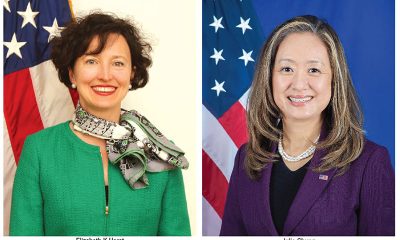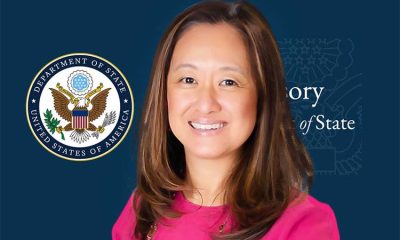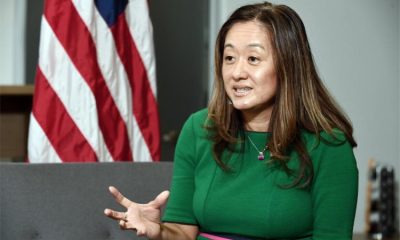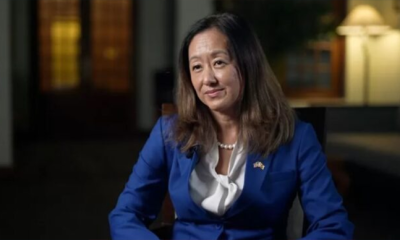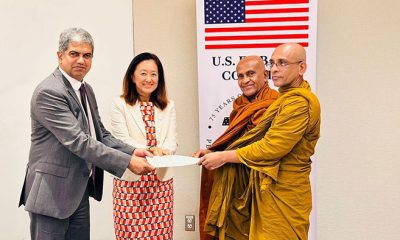News
Chung stresses need to stabilise business environment here ahead of national election

… asks for transparent governance with zero corruption
Reminding that the US and Sri Lanka will have national elections this year, US Ambassador Julie Chung recently emphasised the responsibility on the part of relevant authorities to stabilise the business environment here.
Pointing out a resurgence of interest in two-way investment, Ambassador Chung underscored challenges ahead that will require leadership. She invited Sri Lankan companies to explore ways and means of investing in the US by attending the SelectUSA Investment Summit in June at Baltimore’s national Harbour.
Ambassador Chung said so at Amcham CXO Forum “75 years and Beyond: US– Sri Lankan Business Relations in 2024”
The US Ambassador said: “As leaders, we need to think about both the medium-term and the long-term. In the medium term, we need to create an environment that’s conducive to trade, investment, and business expansion. One with transparent governance, where corruption is no longer tolerated.
In the long-term, we need to raise up a generation of leaders to take our place. There are several ways we should be doing this. Prabhash Subasinghe provides one example: he brought his daughter Saanya into GRI’s marketing leadership. Saanya was educated in the United States, at my alma mater Columbia University, and returned to Sri Lanka to work with GRI. I had the chance to talk with her about six months ago at the U.S. Embassy, where we talked about empowering women leaders. And Harry Jayawardena has similarly recruited his daughter Stasshani to work with him at Aitken Spence.
Stasshani, another impressive up-and-coming leader whom I’ve also met with, is another beneficiary of U.S. training and education. Other leaders are looking to middle ranks to find successors to mentor. Every one of our organizations needs to think more about tomorrow’s leaders. To do that, we need to use our proactive priority-setting power to drive our organizations to identify and train future leaders – both women and men– at all levels. They will, after all, inherit the world we have worked so hard to build.
Commenting on a major US investment in Colombo, Ambassador Chung said: “Just a few months ago, we were proud to announce the International Development Finance Corporation’s investment of $553 million in the Western Container Terminal at the Port of Colombo. Why was this so incredibly important? Beyond the large dollar amount, which is DFC’s second largest exposure in the entire Indo Pacific region; beyond the critical injection of private sector financing this country needs; beyond the confidence building signal it sends to potential investors and financiers that we believe in Sri Lanka’s future, it demonstrates the United States’s continuing commitment to the prosperity of Sri Lanka.”
She also dealt with the challenges posed in the wake of Sri Lanka’s agreement with the IMF. “The commitments required by the IMF as part of the Extended Fund Facility programme call for government reform measures in both tax compliance and combatting corruption. These are hard steps, and not always popular. Sri Lanka has taken difficult measures to put the country on a long-term sustainable footing and comply with the IMF commitments. But the people of Sri Lanka deserve and continue to demand openness, transparency, and accountability from their leaders as the process of reforms moves forward.
The new higher VAT rates have been a hit on the average Sri Lankan and your businesses. We understand that while there may be short term necessary pains, the public deserves to know that such measures are being taken looking at the wholeness of the problem and endemic issues that must be addressed in a structural, sustainable way, fair and transparent to all.
That includes not just raising taxes but eliminating tax loopholes, addressing government inefficiencies, particularly in state owned enterprises. It means digitalizing customs to raise revenue and reduce corruption. Creating predictable customs duties and streamlined processes would encourage importers, who want to import more to Sri Lanka but are worried about the uncertainty in the import process. Unpredictable customs fees discourage importers and limit the amount of customs revenue the Sri Lankan government can collect.
This shifts the burden of tax revenue further onto the shoulders of the people, who can’t bear much more. Earlier this week, I met with the National Chamber of Exporters who relayed some of their challenges – red tape, regulatory challenges, and unpredictability that impact their businesses. Exports and private sector growth will be the engine of recovery, but they need the space and support to thrive. As the largest export market for Sri Lanka, the United States can help be part of the solution.”
She advised the Wickremesinghe-Rajapaksa government on the need for reforms while urging the leadership to be mindful of public concerns. She said: “It’s important that the government of Sri Lanka carry out reforms. But it’s also important to explain those reforms to the people in a clear manner. It makes for slower, but better legislation and reforms. One example is the Online Safety Bill. The Centre for Policy Alternatives reported from a poll earlier this month that more than 70 percent of Sri Lankans were unaware of the Bill before its passage.
When major global tech companies characterize the Bill as “unworkable” and stifling innovation and democracy, instead of actually addressing online crimes, frankly this sends a negative signal in Sri Lanka’s path towards reform and recovery. Previous bills, such as the Personal Data Protection Act, took much longer to craft, but did a better job of taking stakeholder feedback into account. To work on legislation and reforms that will be durable, enforceable, and wise, the Sri Lankan government will need to do better in the future. This will be key to improving the business climate.”
News
US sports envoys to Lanka to champion youth development

The U.S. Embassy in Colombo welcomed the U.S. Sports Envoys to Sri Lanka, former National Basketball Association (NBA) and Women’s National Basketball Association (WNBA) players Stephen Howard and Astou Ndiaye, from June 8 through 14.
The Public Diplomacy section of the U.S. Embassy said that it would launch a weeklong basketball program intended to harness the unifying power of sports, made possible through collaboration with Foundation of Goodness and IImpact Hoop Lab.
While in Sri Lanka, Howard and Ndiaye, both retired professional basketball players, will conduct a weeklong program, Hoops for Hope: Bridging Borders through Basketball. The Sports Envoys will lead basketball clinics and exhibition matches and engage in leadership sessions in Colombo and Southern Province for youth aged 14-18 from Northern, Uva, Eastern and Western Provinces, offering skills and leadership training both on and off the court. The U.S. Envoys will also share their expertise with the Sri Lanka Basketball Federation, national coaches, and players, furthering the development of basketball in the country. Beyond the clinics, they will collaborate with Sri Lankan schoolchildren to take part in a community service project in the Colombo area.
“We are so proud to welcome Stephen and Astou as our Sports Envoys to Sri Lanka, to build on the strong people-to-people connections between the United States and Sri Lanka,” said U.S. Ambassador Julie Chung. “The lessons that will be shared by our Sports Envoys – communication, teamwork, resilience, inclusion, and conflict resolution – are essential for leadership development, community building, equality, and peace. The U.S. Sports Envoy program is a testament to our belief that sports can be a powerful tool in promoting peace and unity.”
News
Rahuman questions sudden cancellation of leave of CEB employees

SJB Colombo District MP Mujibur Rahuman in parliament demanded to know from the government the reasons for CEB suspending the leave of all its employees until further notice from Thursday.
MP Rahuman said that the CEB has got an acting General Manager anew and the latter yesterday morning issued a circular suspending leave of all CEB employees with immediate effect until further notice.
“We demand that Minister Kanchana Wijesekera should explain this to the House. This circular was issued while this debate on the new Electricity Amendment Bill was pending. There are many who oppose this Bill. The Minister must tell parliament the reason for the urge to cancel the leave of CEB employees,” the MP said.However, Speaker Mahinda Yapa Abeywardena prevented Minister Wijesekera responding to the query and said that the matter raised by MP Rahuman was not relevant.
News
CIPM successfully concludes 8th Annual Symposium

The Chartered Institute of Personnel Management (CIPM) successfully concluded the 8th Annual CIPM Symposium, which took place on 31st May 2024. Themed “Nurturing the Human Element—Redefining HRM in a Rapidly Changing World,” the symposium underscored the pivotal role of human resource management (HRM) in today’s dynamic global landscape. Since its inception in 1959, CIPM has been dedicated to advancing the HR profession through education, professional development, and advocacy, solidifying its position as Sri Lanka’s leading professional body for HRM.
Ken Vijayakumar, the President of the CIPM, graced the occasion as the chief guest. The symposium commenced with the welcome address by the Chairperson, Prof. Arosha Adikaram, followed by the Web Launch of the Symposium Proceedings and Abstract Book by the CIPM President. The event featured distinguished addresses, including a speech by Chief Guest Ken Vijayakumar, President of CIPM, and an address by Guest of Honor Shakthi Ranatunga, Chief Operating Officer of MAS Holdings Pvt. Ltd., Sri Lanka.
The symposium also featured an inspiring keynote address by Prof. Mario Fernando, Professor of Management and Director of the Centre for Cross Cultural Management (CCCM) at the University of Wollongong, Australia.
Vote of Thanks of the inauguration session was delivered by Dr. Dillanjani Weeratunga, Symposium Co-chair.
The symposium served as a comprehensive platform for researchers to present their findings across a wide range of critical topics in HRM. These included Cultural Diversity and Inclusion, Talent Development and Retention, Ethical Leadership and Corporate Social Responsibility, Adapting to Technological Advancements, Mental Health and Well-being at Work, Global Workforce Challenges, Employee Empowerment, and Reskilling and Upskilling.
The plenary session was led by Prof. Wasantha Rajapakse. Certificates were awarded to the best paper presenters during the valedictory session, followed by a vote of thanks delivered by Kamani Perera, Manager of Research and Development.
The annual symposium of CIPM was a truly inclusive event, attracting a diverse audience that spanned undergraduates, graduates, working professionals, research scholars and lecturers. This widespread interest highlights the symposium’s significance in the field of HRM, offering a unique opportunity for everyone to network and learn from scholarly brains.The CIPM International Research Symposium was sponsored by Hambantota International Port, Sri Lanka Institute of Information Technology (SLIIT), E B Creasy & Co. PLC, and Print Xcel Company.


